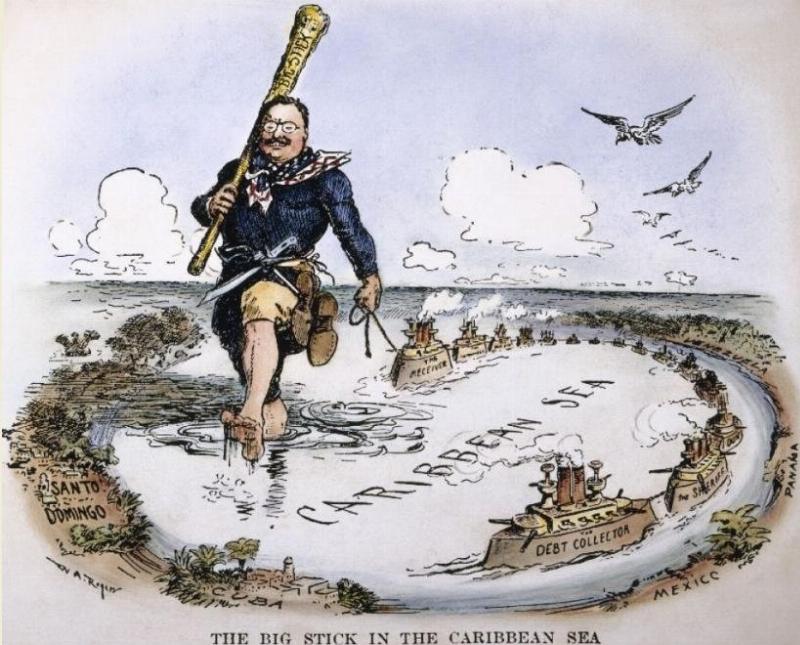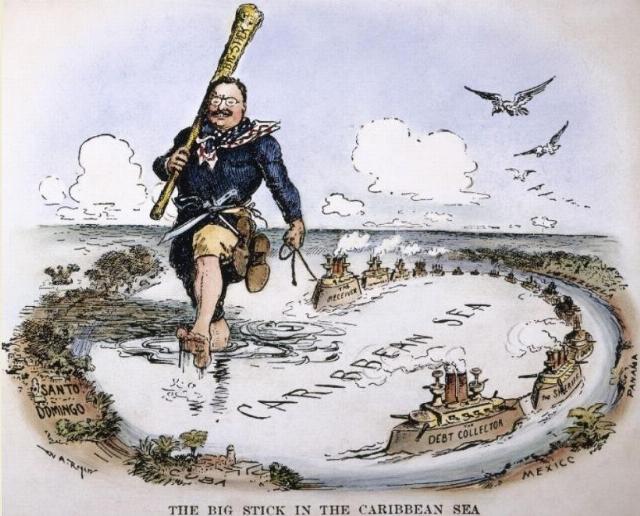


Events are accelerating to a high pitch south of the U.S. Venezuela, Mexico, and Haiti top the list of regional reprobates demanding attention as Trump concludes some of the most pressing Eastern Hemisphere foreign affairs. Recent White House edicts provide hints of initiatives coming sooner than later. These three nations are under the control of criminal administrations and/or gangs. As usual, Trump begins with an artillery barrage of threats. Military force is held in abeyance as a final resort. None of what Trump has planned is groundbreaking. Reagan’s Grenada invasion, Bush 41’s Panama invasion to arrest dictator Manuel Noriega, and Clinton’s Haitian regime change using 20,000 troops were relatively recent examples following similar scripts.
Two reasons make Venezuelan reform a priority: its considerable oil wealth, and the criminals and drugs it’s flooding into America. The Venezuelan timeline has been activated. On July 25 the Treasury Department designated Venezuela’s Cartel de los Soles as a Specially Designated Global Terrorist (SDGT), describing President Nicolas Maduro as one of its leaders. The State and Justice Departments doubled the bounty for the capture of Maduro on August 7. The press release omitted the title of "president," treating Maduro as an individual gang leader. Attorney General Pamela Bondi put on her stern face for her announcement, wore a military-style outfit, and enumerated the tons of cocaine Venezuela smuggles into America through Mexico. She studiously avoided using the term “president.” The pretext for Maduro’s removal will be that he’s a cartel leader, rather than an explicit regime change operation -- a distinction without much of a difference.
If $25 million was insufficient to induce anyone to turn in Maduro, $50 million won’t make much difference. This was a symbolic move, putting Citizen Maduro on notice. He’s being prepped for the treatment Bush 41 applied to Panamanian dictator Manuel Noriega: declare him a drug smuggler, military invasion, arrest, and a 40-year Miami prison sentence. It’s anybody’s guess what sort of diplomatic communications are underway, possibly including a deal with Putin to offer Maduro asylum in Russia (Venezuela’s principal military supplier) alongside Syria’s retired dictator. It’s cleaner and cheaper to offer Russia financial incentives for cooperation. Maduro is going, the easy or hard way. With degraded offensive and defensive capabilities, Venezuela can only lose quickly.
Phase Two entails gunboat diplomacy. On August 20 three guided missile destroyers embarked for Venezuela, 11 days before Iran’s deadline to sign a nuclear agreement. They were accompanied by amphibious Marine assets, several P-8 Poseidon spy planes, and at least one attack submarine armed with Tomahawk cruise missiles. For what it’s worth, Maduro vows 4.5 million militia members will repel any invasion. A demonstration of force against Venezuela may be used to convince wavering Iranian leaders to concede. A positive resolution eventually awaits Venezuela because opposition candidate Edmundo Rodriguez landslided Maduro in a December election Maduro stole from him.
On August 8 Trump signed a “secret” authorization for military options to combat Mexican cartels. Information was leaked at the same time, indicating that drone strikes on Mexican cartels are being considered. Resolving Ukrainian tensions (and leaving NATO in charge) frees troops stationed in Europe for 80 years to be redeployed to Your Favorite Hemisphere. Mexican President Claudia Sheinbaum knew all about the secret order: “We were informed that this executive order was coming and that it had nothing to do with the participation of any military personnel or any institution in our territory… The United States is not going to come to Mexico with the military. We cooperate, we coordinate, but there won't be an invasion... that is ruled out.” She maintains only operations on American soil are authorized. Her denials carefully omitted mentioning the possibility of cross-border and naval missile or drone strikes. Trump is considering unilateral strikes. At least that’s the messaging for public consumption.
On February 20 the Trump administration designated six Mexican cartels (along with Tren de Aragua and MS-13) as foreign terrorist organizations, an action Mexico vigorously protested. Doing so provides Trump statutory authority to proceed unilaterally. Since Sheinbaum took office in October, Mexico increased actions against traffickers, confiscated record amounts of drugs, and sent 29 cartel leaders to the U.S. for prosecution. Trump describes Sheinbaum as “a marvelous woman." As a result of tariff threats, she supposedly requested increased American intelligence-gathering flights to develop targeting lists. Ten thousand Mexican troops were sent to the border in March as a consequence of tariff negotiations. Older readers may recall something about Mexico being forced to pay for a beautiful wall.
 The political reality is that Mexican leaders must carefully choreograph cooperation with the United States. American interventionism is a touchy subject after the Mexican-American War transferred half of Mexico’s territory to American ownership; the 1914 occupation of the port of Veracruz; and the 1916-17 effort to capture Mexican revolutionary General Francisco “Pancho” Villa. Trump is using strategic ambiguity to pressure Mexico into acting independently. If need be, Mexican cartels are no match for the world’s superpower. The cartels are retrenching, laying low, and adopting a policy of waiting out Trump’s administration. It isn’t inconceivable that we may see simultaneous action in Venezuela and Mexico before the seasonal congressional pest reinfestation of Washington on September 2. Congressional meddling wouldn’t be helpful.
The political reality is that Mexican leaders must carefully choreograph cooperation with the United States. American interventionism is a touchy subject after the Mexican-American War transferred half of Mexico’s territory to American ownership; the 1914 occupation of the port of Veracruz; and the 1916-17 effort to capture Mexican revolutionary General Francisco “Pancho” Villa. Trump is using strategic ambiguity to pressure Mexico into acting independently. If need be, Mexican cartels are no match for the world’s superpower. The cartels are retrenching, laying low, and adopting a policy of waiting out Trump’s administration. It isn’t inconceivable that we may see simultaneous action in Venezuela and Mexico before the seasonal congressional pest reinfestation of Washington on September 2. Congressional meddling wouldn’t be helpful.
Haiti is a complete mess. Its recent problems began when a hurricane decimated much of the island in 2010 and the Clinton Foundation appeared to oversee reconstruction. There was no lack of money, either from the U.S. or global sources. Most of it was funneled off by governments, NGOs, and corporate interests, rather than directly benefiting storm victims. Fifteen years later, Haitian gangs now run rampant, with over a million residents displaced. How bad is it? It’s so bad that Trump is in alignment with the U.N. on the need for a multinational peacekeeping force that Kenya leads. The Department of Homeland Security set September 2 for expiration of Temporary Protected Status granted Haitian refugees in America. Due to judicial interference, that date is effectively postponed until February 3, 2026. Approximately 500,000 Haitians face deportation. Erik Prince’s firm, Vectus Global, is advising Haiti's interim government on restoring order and is contracted to take back territory from the gangs and collect revenue (primarily on goods crossing the border from the Dominican Republic). It doesn’t appear significant American intervention is currently contemplated.
Concentrating on Latin American and Caribbean security issues brings the added bonus of silencing the America First/neo-isolationist chorus complaining that too much attention is paid to distant threats. None of the above is without risks. Things could quickly go south if American casualties are incurred. Four American Seals were lost and nine were wounded during the Panama invasion.
Meanwhile, on the opposite side of the globe, the issue of resettling Gazans is coming to the forefront. Egypt has apparently ruled out welcoming Palestinians. Diplomatic immunity has its perks.
Douglas Schwartz blogs at The Great Class War, applying pattern recognition of historical cycles to place current events into context.
Image: Public Domain
